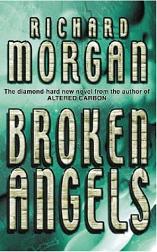
Broken Angels
Richard Morgan
490 pages
published in 2003
Richard Morgan is a British science fiction writer, who debuted in 2002 with Altered Carbon, to which Broken Angels is a sequel. It can however be easily read on its own, considering I just did that with no trouble at all. The only thing it has in common with the earlier novel is the protagonist, Takeshi Kovacs. I'd been aware of Morgan as a hot new writer, but hadn't sampled him yet. Reviews of his work had been mixed and I hadn't been interested enough to seek his books out. Which may have been a mistake, judging from Broken Angels.
From the reviews I'd read and the remarks made by friends who had read his novels I had gotten the impression that Morgan let his leftwing politics overwhelm his stories, while he was also accused of having a lot of unnecessary violence in his stories. I found neither of these allegations to be true in this case. There is a political undertone to Broken Angels, but certainly no dozen page rants; there's violence, but it's not at all reveled in the way John Barnes sometimes does. It reminded me in fact of Neal Asher, another author often accused of excessive use of violence, in that neither shy away from showing the consequences of violence, that being shot hurts and what it exactly does to a body. But where Asher's descriptions are very organic, dripping with ichor and blood and bodily fluids, Morgan's is very clean, sharp, bright and clinical but not at all detached. His characters feel their pain. And they get plenty of opportunities to feel this pain.
Morgan's vision of the future is one in which, despite impressive advances in technology and science nothing much fundamental has changed. It's just that the playing field has gotten bigger. The development of practical interstellar travel, proper AI and life extension by way of personality downloads has meant humanity has spreading through the galaxy, taking all its old problems with it. So instead of corporate backed UN interventions in third world countries in Africa, Takashi Kovacs is a mercenary employed for an intervention in a third world country in another Solar system, on the planet Sanction IV. A dirty war in more than one way as Morgan makes clear from the start, which has his protagonist awaking to horrible pain in the aftermath of one botched operation. While in v.r. awaiting download into a new body, or "sleeve" as they're called, he's approached by somebody with an interesting proposition to recover a valuable Martian artifact.
Yes, Morgan has Martians in his future, though his Martians are actually alien colonists from some unknown star system,long since extinct. These "Martians" have left their tracks all through the local stellar neighbourhood and Martian archeology can be very valuable, especially when an intact Martian artifact is discovered. And this Martian artifact is even more valuable than most -- a teleport gate to a fully functioning Martian spaceship.
Takasi's mysterious visitor turns out to have been the pilot on the prewar archaeological dig which discovered this artifact and he first needs Takasi to rescue his ex-girlfriend from a p.o.w. camp, as she was the sole surviving archaeologist of the expedition, the only one who knows where the gate is and how to activate it. Having done that, Takasi has to find corporate sponsors as well as a squad of handpicked mercenaries as protection. The way that's done is both brilliant and horrifying: they buy up hundreds of "souls" of dead soldiers, then evaluate them in v.r. before downloading the chosen ones into specially radiation-adapted sleeves. Which they will need, as the company's a.i. has predicted the city nearest to the dig will be the subject of a nuclear attack sometime in the next few weeks, as indeed it is.
Once the expedition gets under way things get even more grim, as Takasi and co have to deal with radiation poisoning, sabotage as well as persistent attacks by a nano swarm weapon left by a competitor which learns from its failures and gets harder to defeat every time. It's a race against time to get the portal open before they all succumb to one danger or another, but once they do so they're not quite out of danger yet.
It is at this point that Morgan accelerates the action. There's a lot of plot packed in the last third of the book, a lot of exposition, as the various seeds planted in the first two-thirds come to fruit. The feeling of slowly mounting horror that Morgan had craftily built up now comes out in the open: Takashi and co have the bad luck to reach the ship just as it's under attack by another alien ship, either Martian or something else, both ships in orbits that brings them near each other every several thousand years or so for who knows how many millions of years. Takashi and the others "see" all this psionically through the Martian ship's early warning system. This is a genuinely disturbing scene in a book you already shouldn't read too late at night if like me you're a bit susceptible to nightmares. As I said earlier, Morgan has a clean, detached way of describing violence that stays in your head long after you put the book down.